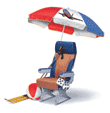Little taste of Oklahoma living
For those of you who aren't familiar with tornadoes here is a short glossary to help you understand.
Fujita Scale: Scale used to measure wind speeds of a tornado and their severity.
F1: Laughable little string of wind unless it comes through your house,
then enough to make your insurance company drop you like a brick.
People enjoy standing on their porches to watch this kind.
F2: Strong enough to blow your car into your house, unless of course
you drive an Expedition and live in a mobile home, then strong enough to
blow your house into your car.
F3: Will pick your house and your Expedition up and move you to the other
side of town.
F4: Usually ranging from 1/2 to a full mile wide, this tornado can turn an
Expedition into a Pinto, then gift wrap it in a semi truck.
F5: The Mother of all Tornadoes, you might as well stand on your front
porch and watch it, because it's probably going to be quite a last sight.
Meteorologist: A rather soft-spoken, mild-mannered type person until
severe weather strikes, and they start yelling at you through the t.v.:
"GET TO YOUR BATHROOM OR YOU'RE GOING TO DIE!"
Storm Chaser: Meteorologist-rejects who are pretty much insane but get us
really cool pictures of tornadoes. We release them from the mental
institution every time it starts thundering, just to see what they'll do.
Tranquilizer: What you have to give any dog or cat who lived through the
May 3rd, 1999 tornado every time it storms or they tear your whole house up
freaking out of their minds.
Moore, Oklahoma: A favorite gathering place for tornadoes. They like to
meet here and do a little partying before stretching out across the
rest of the Midwest.
Bathtub: Best place to seek shelter in the middle of a tornado, mostly
because after you're covered with debris, you can quickly wash off and
come out looking great.
Severe Weather Radio: A handy device that sends out messages from the
National Weather Service during a storm, though quite disconcerting because
the high pitched, shrill noise just as an alarm sounds suspiciously just
like a tornado. Plus the guy reading the report just sounds creepy.
Tornado Siren: A system the city spent millions to install, which is really
useful, unless there's a storm or a tornado, because then of course you
can't hear them.
Storm Cellar: A great place to go during a tornado, as it is almost
100% safe, though weigh your options carefully, as most are not cared for
and are homes to rats and snakes.
May-June: Tourist season in Oklahoma, when people who are tired of bungee
jumping and diving out of airplanes decide it might be fun to chase a
tornado. These people usually end up on Fear Factor.
Barometric Pressure: Nobody really knows what this is, but when it
drops a lot of pregnant women go into labor, which makes for exciting
moments as their husbands are trying to drive them to the hospital and
dodge tornadoes at the same time.
Cars: The worst place to be during a tornado (next to a mobile home).
Yes, you can out run a tornado in your car...unless everybody on the road
decides to do the same thing, and then you're in grid lock.
A Ditch: Supposedly where you're supposed to go if you find yourself
without shelter or in your car during a tornado. Theoretically the tornado
is supposed to pass right over you, but since it can lift a 20 ton truck
and up root a three hundred year old tree, I'd bet my life on out-running
it in a car.
Mobile Home: Most people are convinced mobile homes send off some strange
signal that triggers tornadoes, because if there's one mobile home park in
a hundred mile radius, the tornado will find it.
Earthquake: What any Californian would rather go through on any scale of
severity than face a tornado.
Tornado: What any Oklahoman would rather go through on any scale of
severity than face an earthquake.
Twister: Slang for 'tornado' and also the title to a movie starring Helen
Hunt, which incidentally everyone thought was corny and unrealistic until
May 3rd, 1999.
Power Flash: One of the most reliable ways to track a tornado at
night, it's the term used when the tornado hits a power line and a bright
light flashes. It's also the emotion experienced by meteorologists when
they get to make the call to interrupt prime-time must-see t.v. and a
million dollars worth of advertising to track a storm for viewers.
Here are some phrases you might want to learn and be familiar with:
"We'll have your electricity restored in 24 hours," which means it'll be a
week.
"We're going to be out for a week, so buy a lot of supplies and an
expensive generator," means it's going to be on in twelve hours, probably
as soon as you return from Wal-Mart.
"It's a little muggy today." Get outta town. It's getting ready to storm.
"There's just a slight chance of severe weather today, so go ahead and make
your outdoor plans." Ha. Ha ha ha ha.
And the BIG TIP of the day:
When your electricity goes out, and you go to bed at night, be sure to turn
off everything that was on before it went out, or when it is unexpectedly
restored in the middle of the night, every light, every computer, your
dishwasher, your blow dryer, your washing machine, your microwave and your
fans will all come on all at once.
1) You'll just about have a heart attack when they all come on at the same
time, waking you from a dead sleep. And 2) Your breakers will blow, leaving you in the dark.


 LinkBack URL
LinkBack URL About LinkBacks
About LinkBacks

 Reply With Quote
Reply With Quote
Bookmarks